PHILOSOPHY, BELIEFS AND CONFLICTS
We take so much on trust. We rely on the authority of experts, trusting that textbooks of chemistry or physics get things broadly right, that historians give a correct picture of at least the central chronology of the French Revolution, or that economists have at least a bit more understanding than we do of the causes of a recession. Many people take on trust much of what their parents or their society believe about morality, politics or religion. These items and others like them make up the worldview of a particular society at a given time. Often, as people get older, they notice less these spectacles through which they view the world, growing increasingly comfortable with the idea that they see the world just as it is.
But children and young teenagers often do notice. “How do you know there is a God?” “When you see green, is it just the same for you as it is for me when I see green?” “Why is it wrong to break the law?” “Can you prove evolution is true?” And so on. Many of them are natural philosophers, asking questions adults have often forgotten or brushed aside as practically unimportant or unanswerable. Some teenagers are struck by the thought that, if they had lived, not in Britain but in China, or at some other time in the past or the future, they would have many different beliefs. And this leads straight to the centre of philosophy: How do I know that any of this stuff I have been taught to believe is really true?
This teenage thought is central to a conversation Alan Ryan and I had under the auspices of the Forum for European Philosophy, at the London School of Economics. This film of the discussion also reflects the fascination our audience held for the cameraman.
How do I know if what I believe is true? (LSE Meeting: Part one)
Common-sense is part of the home-made ideology of those who have been deprived of fundamental learning, of those who have been kept ignorant. This ideology is compounded from different sources: items that have survived from religion, items of empirical knowledge, items of protective scepticism, items culled for comfort from the superficial learning that is supplied. But the point is that common-sense can never teach itself, can never advance beyond its own limits, for as soon as the lack of fundamental learning has been made good, all items become questionable and the whole function of common-sense is destroyed. Common-sense can only exist as a category insofar as it can be distinguished from the spirit of enquiry, from philosophy.
Philosophers are among those who do not give up on these questions, and go on taking seriously the challenge to show which beliefs are true, or at least which are more reasonable to accept than others. They try to work out standards that beliefs have to meet to stand a decent chance of being true. Although the standards are themselves disputed, even those that sound like platitudes often raise doubts that disconcert conventional opinion.
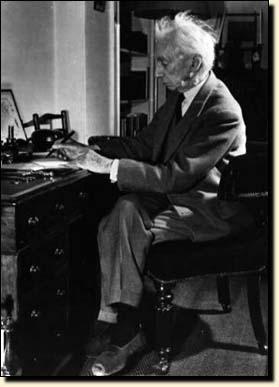
I wish to propose for the reader’s favourable consideration a doctrine which may, I fear, appear wildly paradoxical and subversive. The doctrine in question is this: that it is undesirable to believe a proposition when there is no ground whatever for supposing it true. I must, of course, admit that if such an opinion became common it would completely transform our social life and our political system; since both are at present faultless, this must weigh against it. I am also aware (what is more serious) that it would tend to diminish the incomes of clairvoyants, bookmakers, bishops and others who live on the irrational hopes of those who have done nothing to deserve good fortune here or hereafter.
You may decry some of these scruples and protest that there are more things in heaven and earth than are dreamt of in my philosophy. I am concerned, rather, that there should not be more things dreamt of in my philosophy than there are in heaven or earth.
The process of sound philosophizing, to my mind, consists mainly in passing from the obvious, vague, ambiguous things, that we feel quite sure of, to something precise, clear, definite, which by reflection and analysis we find is involved in the vague thing we start from, and is, so to speak, the real truth of which that vague thing is a sort of shadow.
Of course many disciplines other than philosophy are concerned with sifting truth from falsehood. Each has its own standards of competence and integrity. Scientists must not fudge their experimental results, and will be found out if other groups cannot repeat their work. Historians must not quote only sources that favour their thesis. Philosophy too has its own intellectual standards (though they themselves are up for debate). The hope of progress in philosophy depends on habits of clarity, explicitness and rational argument, that together constitute philosophical competence and integrity.
I am acutely conscious of the difficulties of my views and the insufficiency of my arguments, and yet I cannot at present see any other way of describing matters which seems at all plausible. If I am mistaken in what I have said about these topics, I hope that I have at least written clearly enough to be found out quickly.
PHILOSOPHY AND CONFLICTS BETWEEN RIVAL POLITICAL OR RELIGIOUS WORLDVIEWS.
Probably most people who spend a lot of time thinking about philosophy do so because of the deep interest of the questions and the intellectual challenge their difficulty poses. But the conventional wisdom that these questions have little practical relevance is mistaken. In recent times, philosophical argument has been applied to many ethical issues: to questions about human rights and the just society, to medical ethics, to the ethics of war, to the genetic choices now becoming possible, to our treatment of animals and to environmental issues.
But there is also a case for the practical relevance of parts of philosophy other than ethics. The world is full of rival systems of political or religious belief, and these ideological conflicts sometimes lead to war or other violence.

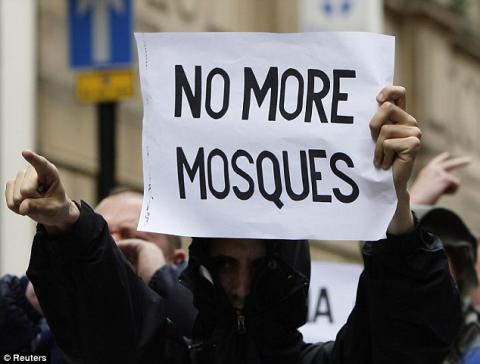
Philosophers, at least since Socrates, have debated the relative merits of different reasons for believing something true. Yet, so far, philosophers have contributed little to the dialogue between rival believers that is surely the preferred alternative to violence. It would be a sad comment on the long history since Socrates if philosophy had nothing to contribute to the alleviation of ideological conflicts.
One merit (among obvious others) of a society where where rival beliefs are argued with rather than persecuted is that it creates the possibility of rational discussion making this kind of contribution.

THOMAS JEFFERSON: THE VIRGINIA STATUTE, ON A WALL BY A CAR PARK IN RICHMOND.
The Royal Irish Academy generously invited me to choose the topic for a one-day conference and to give the opening lecture. This gave me an opportunity to develop some thoughts on how it might be possible for philosophical discussion of the contrasts between well-founded and poorly-founded beliefs to help to reduce ideological conflict.
Irish Academy Lecture: Ideological Conflict, Belief and Philosophy
RIVAL NARRATIVES AND CONFLICT: TEXT OF A LECTURE, AN E-MAIL DIALOGUE, AND DVD OF ANOTHER LECTURE.
Where different "tribal" groups (whether the "tribes" are ethnic or religious or both) have been in conflict for some time, the two sides normally have rival narratives about how the conflict originated and developed and about who is to blame. For some time I have been interested in how these narratives help sustain conflicts by reinforcing negative stereotypes of the other group. In Philosophy and the Darkness of this Time, the five Wittgenstein lectures I gave at the University of Bayreuth in 2007, one of the lectures discussed this issue taking the Israel-Palestine conflict as an example.

When I was invited to give the Simone Weil lecture in Melbourne and Sydney in 2008, I took the opportunity to develop these ideas further.
Simon Weil Lecture: Uprootedness, Narratives and Conflict
One opportunity which the Australian invitation seemed to provide was to link up the questions about rival narratives with Simone Weil's ideas about the importance of being rooted, and I discussed links between the impact of different kinds of uprootedness, historical and present, on Israelis and Palestinians.
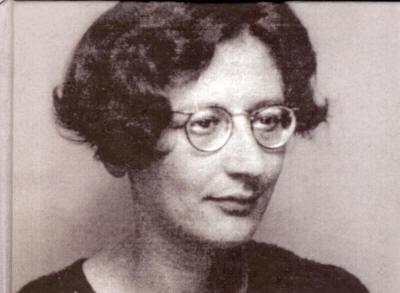
SIMONE WEIL.
But, while I was interested in Simone Weil's thoughts about roots, I knew much less than I should about her own history. There turned out to be a strong case for the view that the link to Simone Weil was unwise. The e-mail correspondence below, starting with a critical e-mail from the Israeli philosopher Berel Lerner, brings out what I had to learn. Professor Lerner first came across an interview about the lecture I gave to the Australian radio programme The Philosopher's Zone.
I have asked Professor Lerner to introduce our correspondence.
I was flattered -and also a bit worried- when Prof. Glover asked me if he could web-publish our correspondence concerning his Simone Weil lecture. I am far from being any kind of Weil scholar and my emails were not written with the care appropriate to published work. An unfriendly reader could select sentences that sound awful when quoted out of context. Fortunately it would be very surprising if anyone thought it worthwhile to invest time on that project! There is always one more point or clarification or reconsideration to be made regarding the Arab-Israel conflict; for the moment I will exercise restraint. I hope my attack on Weil does not make me sound like a witch-hunter. After all, if we were to reject every author who has said something unfavourable about Jews or Judaism, Europe's intellectual legacy would be left in tatters.
Dear Professor Glover,
I was just listening to the podcast of your interview on the Australian "Philosopher's Zone" program. I am not entirely pleased with your take on the Arab-Israel conflict, but that is a long story; on to Simone Weil.
As a Jew and an Israeli, I find it wildly ironic to find her mentioned as a moral authority in this context. Simone Weil was, of course, born into a Jewish family. During the war she bewailed the fate of occupied France, but, as far as I know, she was never moved to any demonstration of solidarity with the 6,000,000 Jews slaughtered in those years. It has been quite a while since I read her essay on the Iliad, but I recall being taken aback by what can only be described as her intellectual antisemitism -she saw the Jewish tradition as a paradigm of chauvinist evil and insisted that all that is good and worthy in Christianity derived (but of course!) from purely Greek sources. And then there is the matter of her notorious letter to the Vichy authorities, in which she insisted that it was unfair for her to be denied employment as a Jew since she was not a Jew at all, bit rather, "mine is the Christian, French, Greek tradition".
I hope you can appreciate why it is not a little odd to suggest that Israeli Jews should learn something about the need for "rootedness" from "Saint" Simone Weil.
Best regards,
Berel Dov Lerner.
e-mail September 12, 2008.
Dear Professor Lerner,
Thank you for your message. I was on holiday in France when it came...
You obviously know more about Simone Weil than I do. I know little of her life and you may have heard me floundering a bit when unexpectedly asked about it in the Australian radio interview. If she was antisemitic this is obviously an overwhelming reason for not linking my ideas to hers. In fact I developed my thoughts on parallels between the Jewish and Palestinian experience of exile independently of Simone Weil's views. I expressed much the same thoughts in a series of Wittgenstein lectures I gave without mentioning her. But, when asked to give the Simone Weil lecture, I remembered reading her ideas on the need for roots and the consequences of uprootedness, and thought going back to them might be a useful way of linking what I had to say with the title of the lecture series. Until your message sparked my interest I had little interest in Simone Weil as a person. If she was saintly this cuts little ice with me, as it is a virtue so bound up with religious beliefs I don't share, and anyway on the whole I prefer the company of sinners to that of saints.
The force of your comments depends on the evidence for the charge of antisemitism. I have read -and mentioned in my lecture- her essay on the Iliad. When I read it, I did not notice antisemitism, but this may have been obliviousness on my part. I can't at the moment find my copy of her book (I am retiring and this has resulted in a move of thousands of my books from shelves in my office into vast numbers of bags, that are hard to sort through.) When I get hold of the book again I will re-read it with your comments in mind.
You cite two other pieces of evidence for Simone Weil's antisemitism. Both involve her refusal to identify with Jews. One of the things that make this charge in general difficult to assess comes from the familiar complexity of the concept of being a Jew. Simone Weil both was and was not a Jew. On the ancestry criterion, she had a Jewish mother and so undoubtedly was a Jew. On the religious criterion, she had converted to Christianity and so undoubtedly was not a Jew. I believe in people being free to choose their religious or non-religious affiliations, regardless of their ancestry. I had Christian ancestors and was brought up as a Christian, but have become an atheist. I find it mildly irritating if anyone describes me as a Christian on the basis of my ancestry. And I do not feel that, when a massacre of Christians and others takes place, I should protest particularly against the Christian deaths. What I am against is people being killed. These comments are probably platitudes and I suspect you may agree with them. If so, the issue is whether they do anything to exonerate Simone Weil from your criticism that she was never moved to any demonstration of solidarity with the six million Jews killed in those years. Here my own thoughts go in two different directions. On the one hand, given the horrors being inflicted on victims of whom the overwhelming majority were Jews, and inflicted on them because they were Jews, everyone should have protested. That so few did is a stain, not only on Germany but on Europe as a whole. I include countries like mine, where our fathers and grandfathers fought against the Nazis, because the evil of what the Nazis were doing to Jews seems to have played too small a part in the national consciousness of what the war was about, and some policy decisions seem to have been tinged with an antisemitism sadly conventional at that time. (I have discussed this in my book Humanity.) So, yes, Simone Weil, like everyone else, should have spoken out, and like many others, shamefully did not. But did she have more of a duty to speak out because of her Jewish ancestry? I am not sure she did.
The other piece of evidence you cite for her antisemitism is her letter to the Vichy authorities, saying she should not be denied employment as a Jew as she was not one, but that her tradition was the Christian, French, Greek one. I did not know about this letter, and have not read it. I certainly do not like the sound of it. I am happy for her to choose whatever tradition she wants to identify with, and think that the Nazis' use of the "biological" ancestry criterion in deciding who to demonize and to murder is an additional evil aspect of what they did. But I would only think her letter acceptable if it included a protest against the discrimination against those who unambiguously were Jews. From what you say I assume it did not, and so I share your disapproval, and can see that Jews in Israel may, because of this letter, not want to take Simone Weil as someone to learn from.
You say it is "not a little odd to suggest that Israeli Jews should learn something about the need for rootedness from Simone Weil". My lecture (attached) was intended to encourage Israelis and Palestinians to think about a set of things where they might have something to learn from each other, rather than from Simone Weil. You may not agree with it, but if you decide to look at it you will get a clearer idea of its intentions than will have been given by the radio interview.
You start your e-mail by saying "I am not entirely pleased with your take on the Arab-Israeli conflict", and then move on to Simone Weil. (I wonder if it is worth making that sort of comment if you haven't time to give reasons.) The lecture will give more idea of what my "take" is. Its aim is not to make people "pleased", but to encourage people on both sides of the conflict to think again about their entrenched attitudes to it.
Thank you for taking the trouble to write and for contributing to my education about Simone Weil.
Best wishes,
Jonathan Glover.
e-mail September 13, 2008.
Dear Prof Glover,
Thank you for taking the time to answer my letter thoughtfully and at length, and for sending me the text of your lecture.
I am afraid my letter to you was a bit telegraphic and thus unclear. My main point was not to prove that Simone Weil was an antisemite but rather that she had a particularly problematic relation to her own Jewish roots. She wasn't just someone who happened to have been born into an assimilated Jewish family and came to hear reports of Jews being persecuted in some distant land. She lived in Vichy France and was personally affected by its state antisemitism. I just wanted to say that it is very ironic to suggest that Jewish Israelis learn a lesson on the need for roots from someone who so completely denied her own Jewish roots (even as her beloved fellow-Frenchmen reminded her of them!)
Was Weil an antisemite? Perhaps it was wrong of me to use that overused term. I am willing to be charitable and assume that she was not an antisemite in the technical, racial sense of the term. She did have a very low opinion of Judaism and in that sense she can be called anti-Jewish. I don't have any of her works with me ready-to-hand, but I managed to take another look at her essay on the Iliad via the "online reader" feature of the Amazon.com website. Skimming again through the end of that essay, I saw how she attributes the peculiar moral sensitivity of of the Gospels to Greek sources, while claiming that it could be found nowhere in the Hebrew Scriptures, except in the Book of Job. How little respect did Weil have for Judaism? Consider this quote from another essay of hers, "The Beast":
"Rome is the Great Beast of atheism and materialism, adoring nothing but itself. Israel is the Great Beast of religion. Neither one or the other is likeable. The Great Beast is always repulsive." (Pg 123 in Sian Miles's "Simone Weil: An Anthology".)
And perhaps the following has some bearing on her opinion of the Jewish right to "roots":
"Perhaps there was only one ancient people absolutely without mysticism: Rome. By what mystery? It was an artificial city, made of fugitives, just as Israel was." (Pg 24 in Miles.)
I know that these quotations refer to ancient Israel -but it is a bit creepy that they were written by someone of Jewish extraction living in Europe in the first half of the twentieth century. Definitely pre-Vatican II!
As for my opening line, "I am not entirely pleased with your take on the Arab-Israeli conflict." I do apologize for that; while writing the letter I had thought of addressing some other issues at length, but eventually decided to stick to the Simone Weil issue. The opening sentence was something like a mental note that somehow got typed. What was I thinking of? The Israelis are actually pretty well informed about the Palestinian narrative. Much of Israeli literature, cinema, historiography, journalism and academic research is sympathetic to Palestinian claims. It is almost as if there were no need for Palestinians to take pains to make their case: they could sit quietly on the sidelines and let the Jews do it for them!
Now for a little nit-picking. In your lecture, you wrote: "Many Jews in Jerusalem were afraid of being uprooted again". There is a part of the Old City of Jerusalem traditionally known as "the Jewish Quarter". That, of course, was inhabited by Jews before the rise of the Zionist project. (Jews also lived in the "Moslem Quarter".) On May 28th, 1948 the Jewish Quarter was captured by the Jordanian army and its inhabitants were forcibly expelled. Those Jews of the Old City were not newcomers to Jerusalem, they were not refugees who had been recently uprooted, "afraid of being uprooted again". Many of them belonged to long established Jerusalemite families, and they did not merely suffer fear of being uprooted -they actually were uprooted by the Arab forces.
More nit-picking. I noticed that in your lecture that you repeated the claim made by an unsuccessful suicide bomber that, "Soldiers had tried to strip her naked at a checkpoint and danced around with her as if she were an inflatable sex toy."
Notice that by her own account the soldiers did not strip her -they only tried to- and she felt they treated her as if she were an inflatable sex toy by "dancing around with her" -I do not have any first hand experience with such things, but I am pretty sure that such dolls are not usually used as dance partners. Could it be that this account does not accurately describe what the soldiers were actually up to?
I can appreciate that this woman felt very humiliated and I do not deny that the soldiers might have wilfully mistreated her. But I also must say that she sounds as if she is describing some kind of search that was made on her body against her will. (As far as I know, women are always searched in private by woman soldiers unless there is some immanent danger of a bombing. When a suicide bomber was on the loose in my own neighbourhood a few years ago, several members of my kibbutz who were working in the fields at that time were required to strip search when soldiers were unsure of their identities.)
So: in your radio interview, a unique report (and one lacking a source in your lecture transcript) of an incomplete sexual-assault (which actually sounds very much like an account of the humiliation felt by a woman who had resisted being searched at a checkpoint) morphs into:
"And this is very parallel to the humiliations that Palestinians now describe in the Occupied Territories, being taunted by Israeli soldiers, women being humiliated, being treated as sex toys, forced to kiss Arab men and so on."
To me it sounds as if you were saying on the radio that Palestinian women being treated "as sex toys" is a widespread phenomenon and indicative of the general situation on the ground. The problem is that the soldiers who man those checkpoints are also human beings and they deserve to be protected from libel -even if it means that one might have to do without an especially "juicy" accusation.
Best regards,
Berel Lerner.
e-mail September 14, 2008.
Dear Professor Lerner,
Thanks for this response.
I agree about the irony of "a lesson on the need for roots from someone who so completely denied her own Jewish roots".
I too dislike the "Great Beast" rhetoric. It certainly does not sound friendly to ancient Israel, and as you say in Europe in the mid-century such comments take on a creepy note. Also, a philosopher should write clearly and without rant. The rhetoric reminds me of signs I saw in Iran about "America the Great Satan". It is rant, and whatever point she is making is very unclear.
Thanks for your explanation of your "not pleased" mental note. I agree that there is among some groups in Israel great understanding of the Palestinian narrative. As you are a philosopher you will know my friends Noam Zohar, David Heyd and Yuli Tamir. When I was in Jerusalem a couple of months ago, I only saw Yuli briefly, but I spent a lot of time with David and Noam, and was constantly struck by their sensitivity to the "other side's" narrative. (In fact both helped me enormously in my visit to Ramallah to meet friends of one of my students who is strongly on the Palestinian side and believed my teaching in our global ethics course was biased in favour of Israel.) I have also read Israeli historians who are acutely aware of the Palestinian narrative, and (e.g.) some of Avishai Margalit's articles in the New York Review of Books. So, if I seemed to suggest that all Israelis needed to hear the Palestinian narrative, this did not reflect my actual view. But I do think that quite a few on both sides do need to listen more sympathetically to the "other" narrative. Again, we can't usefully say much about "the Israelis" or "the Palestinians", each of which encompasses many different groups.
On your "nit-picking" points. The first one I absolutely accept. Jews who had lived in Jerusalem for centuries feared being uprooted rather than being uprooted "again". I was thinking of Amos Oz's account in his autobiography, and thinking of his family having left Russia and Poland. It was sloppy if I gave the impression that for everyone Jewish it was a question of being uprooted again. On the point about actually being uprooted rather than just fearing it, I did mention Jewish villagers being massacred.
I am less persuaded by your second "nit-picking" point. Neither you nor I (nor, I guess, the woman who made the point) would claim expertise on inflatable sex toys. Probably people don't dance with them, so the analogy may be a bit off the mark. But what she actually says is that the soldiers danced around with her, and I feel that your gloss on this -that they were attempting to search her body- seems to underplay the accusation I see in her words that they were treating her as a sex object and intentionally humiliating her. Of course, anyone's testimony may be -either intentionally or unintentionally- misleading, and so it cannot just be assumed to be correct. But this is a problem for any of us who try to get a picture of any political situation. We have to listen to testimony of people about their experiences, listening either for the ring of truth or for the false note and sometimes not being sure we hear either. You and I have different hunches about how to read this woman's account. We are not very far apart, as you say that you don't deny that the soldiers may have wilfully mistreated her. But on our different hunches we both have a problem. I think my interpretation is more plausible than yours, but you think yours is more plausible than mine. We both know that the question of how plausibility should be judged is very complex and difficult, so perhaps we should not have that conversation by e-mail but save it for a conversation if we ever meet in person. I am sorry I did not give a source for the woman's story in my lecture. It comes from Sari Nusseibeh's autobiography, where he quotes someone else's report of interviews, which he does not reference. I meant to try to track down the original source and refer to that, but have not done so.
On your objection to my radio interview's interpretation, I think I stand by the substance of what I said. On my interpretation of her words, she was humiliatingly treated as a sex object, rather than just searched. So, with the substitution of "sex object" for "sex toy", I think it reasonable to say what I did. My point was that humiliation is widespread and I gave being treated as a sex object as one example. It does not imply that being treated as a sex object is a widespread phenomenon, but is one episode cited as part of the case for saying that humiliation is common. I am not out to libel people, Israeli soldiers or anyone else. While writing the lecture, I had in mind the thing Amos Oz says at the start of "Help Us To Divorce", that Europeans discussing this conflict are often pointing accusing fingers at one side or the other and he thinks this inappropriate. So I was not out to make accusations. But, of course, the two narratives are full of accusations, and to discuss these narratives requires mention of some of them. I don't accept that victims of humiliation, like this woman (or victims of Palestinian suicide bombing policy) should be denied a hearing in order to avoid any danger of libelling people on the other side. And -the one point where I felt pained by your comments- I am not only not making accusations, but am certainly not looking for "an especially juicy accusation". (What sort of person do you think I am?)
So: some agreement and some continuing disagreement. Perhaps the best we can hope for on these contentious topics? I appreciate your seriousness and the trouble you have taken. I have learnt from you and hope we may meet some day and have a friendly conversation about our disagreements.
With best wishes,
Jonathan
e-mail September 15, 2008.
Dear Jonathan (if I may...),
Well I certainly appreciate the time you have taken to respond to my letters and the pleasant fashion in which you did so. Here I've been corresponding with Jonathan Glover -rattling the skeletons in Simone Weil's closet instead of thinking of something brilliant to ask or say about bioethics (not that I have anything particularly brilliant to say about bioethics at the moment).
I would like to offer a small bit of explanation in connection with "juicy accusations". You asked "What sort of person do you think I am?" And I would answer: "A really nice guy". However, the "juicy accusations" problem is omnipresent in contemporary culture. (Maybe it is even part of "human nature"?) Even the most conscientious among us can only steer clear of it by constant vigilance, and all of us fall into its trap from time to time.
So, next time you are in Israel, perhaps we can meet? In the meantime let me thank you again for your calm and thoughtful responses to my grumblings.
Best regards,
Berel.
P.S. If you are interested in reading something about my own "situation in the middle east" a partial picture can be gathered from an interview I gave this year , available at http:www.jewishdesmoines.org/page.aspx?id=168479.
e-mail September 18, 2008.
Dear Berel,
Thank you for ending this correspondence on such a friendly note. I very much hope we can meet when I am next in Israel. (Or if you are ever in London.) I liked your interview, especially the complexity of your attitudes and your teaching, and the thoughts on Athens v Jerusalem. I am almost entirely an Athens person, but rather fell in love with Jerusalem when Noam Zohar and David Heyd showed me round. I have mentioned our correspondence to both of them, and would like to ask if I can show it to them? I don't think that either of us need be embarrassed by anything we said, but I appreciate that you wrote as a private correspondent and so may prefer it to remain that way, which I will of course respect.
At the start I was rather daunted by this obviously well informed Israeli sending a blast of possibly merited disapproval. So it is nice that at the end I am looking forward one day to meeting you and with luck becoming your friend.
Warmest wishes,
Jonathan
e-mail September 18, 2008.
Dear Jonathan,
Actually after my first letter I started worrying that I sounded like an anti-antisemitic witch-hunter; when I originally read some of Simone's writings they really rubbed me the wrong way and I guess I never got over it. Nevertheless, I suppose what I wrote wasn't too embarrassing, so feel free to share it with others. I would be surprised if David Heyd or Noam Zohar know who I am, but they may have some interest in our correspondence.
I also look forward one day to meeting you and with luck becoming your friend.
Best regards,
Berel
e-mail September 18, 2008.
Dear Berel,
Thanks,
Jonathan
Having been persuaded that Simone Weil was not going to be helpful in the minefield of the Israel-Palestine conflict, I developed the same ideas without reference to her in a lecture at the Philosophy Department at the University of East Anglia, here introduced by Professor Tim O'Hagan. The occasion was notable for the quality of the questions asked. (Unfortunately not always matched by the auditory quality of the questions as picked up in the film.) There were perceptive questions that were demanding to answer. And there were questions from both supporters of Israel and supporters of Palestine, sometimes with an impressive openness to the experience of those on the other side.
UEA Lecture: Narratives That Kill: The Case Of Israel And Palestine
Similar issues were discussed more informally in the conversation with Alan Ryan at the London School of Economics.
A NOTE OF CAUTION: TWO ATTEMPTS AT DIALOGUE
A NOTE OF CAUTION: TWO ATTEMPTS AT DIALOGUE
Teheran
In about 1990, through the support of three American philosopher friends, Dan Wikler and Bill and Sally Ruddick, I was invited to go with them to a medical ethics conference in Teheran. The conference was called “Medical Ethics under Allah”. The fact that I do not believe in the existence of Allah (or of any other version of God) might seem a large disqualification. The title I was asked to speak on was wildly optimistic: “How to choose between competing ethical theories”. To answer that, just being underneath Allah might not be enough: one might have to be Allah. But my curiosity to hear how medical ethics was discussed in Iran, together with my enthusiasm for dialogue with those of different beliefs, overcame any doubts I had on these grounds. I also had an intense curiosity to see Teheran and (especially) Isfahan, and loved the idea of such an interesting trip in such congenial company.
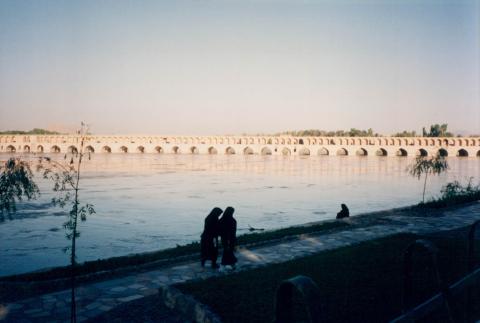



WOMEN AND MOSQUES, ISFAHAN.
There was another, more serious, obstacle to accepting the invitation: the Satanic Verses affair. Ayatollah Khomeini had issued a fatwa calling on Muslims to kill Salman Rushdie.
I had a tiny personal link to Salman Rushdie, not one that he would remember, but which left me a small debt of gratitude. We had both been at a conference on “The Real Me” at the Institute of Contemporary Arts in London. (Rather improbably, a talk of mine about self-creation and personal identity was replied to by Salman Rushdie and Oliver Sacks. I think I went partly through being flattered by this unlikely turn of events.)
Part of my theme was the way your life can be seen as a novel in which you are both a character and the author, and I talked about Proust. In Salman Rushdie’s reply, he rightly reminded me that many of the world’s poor are too busy trying to stay alive to have much time for self-creation. Several people in the audience did not like what I said, and one accused me of thinking of the novel purely in terms of outdated narrative in the style of nineteenth century novelists like Tolstoy. I have been forever grateful that, before I could reply, Salman Rushdie said, “We novelists admire those nineteenth century writers like Tolstoy”.
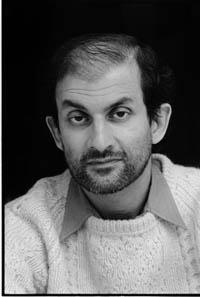
But, even without this debt of gratitude, how could I speak at a conference in Teheran, in the presence of some of the Ayatollahs who ran the regime that had a death threat out against one of my fellow-citizens, as if none of this had happened? When I said I would have to oppose the fatwa, my family were aghast. They thought I would do nothing for Salman Rushdie and might also be locked up for years in an Iranian prison. They did not want me to go at all if it involved speaking out.
We reached a compromise I am not altogether proud of. When not on the podium, I would, and did, make my own objections clear and also tell people that there would be no better relations with Britain while this incitement to murder remained. I promised my family that, in my talk, I would not use the words “Salman Rushdie”, “Satanic Verses” or fatwa. But in my talk I did argue that “choosing between competing ethical theories” required the methods of Socrates. It also requires freedom of speech even for those whose ideas we find shocking. I reminded them of the huge mistake the Athenians made when they executed Socrates because they found what he said shocking. Looking back, I wish I had spoken in a less coded style. In one way I was pleased that the Ayatollah chairing my session gave my talk a notably frosty reception, as this suggested the message had come across. But my invitation to discuss our differences openly in a friendly spirit met with no response.
International Congress on Medical Ethics, Tehran
After the bombs in Iraq and London

A GIRL VICTIM OF THE 2003 BOMBING OF IRAQ.
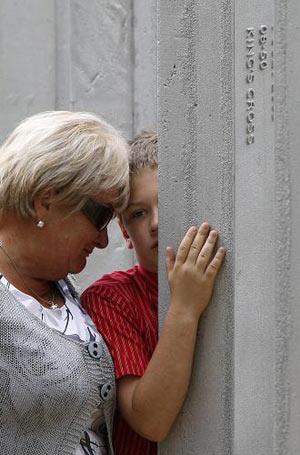
A WOMAN AND A BOY AT THE MEMORIAL TO THE VICTIMS OF THE LONDON BOMBS.
After the bombing of the London bus and underground system on July 7 2005, one public opinion poll reported that nearly a third of British Muslims agreed with the statement that “Western civilization is decadent and immoral and that Muslims should seek to bring it to an end”. 1% supported using violent means if necessary, while 32% thought only peaceful means should be used. The number of British Muslims was at that time estimated to be about 1.6 million. There are problems about interpreting opinion polls. But, if the poll was reliable, there were at that time around 16,000 Muslims who were prepared to give at least verbal support to using violence, and over half a million who thought that peaceful means should be used to end the decadent and immoral Western civilization.
In a country where half a million people say the decadent and immoral way of life of the others should be brought to an end, people need to talk to each other. I wrote an article in the Guardian saying this.
Dialogue with Islam is the only way to end the cycle of violence
The dialogue advocated was a Socratic one, with each side listening to, but also challenging, the beliefs of the other. For a few days I was inundated with e-mails, the great majority supportive, but with a substantial hostile minority, mainly from the United States and Canada, some mentioning Chamberlain and unable to distinguish between “dialogue” and “appeasement”. Among the e-mails was one from Sheikh Haitham Haddad. He is a Sheikh from Saudi Arabia and also Imam of a London mosque. He thought that many who spoke for Muslims on television had a watered down, liberal version of the religion. He suggested that a debate with him would be about the real thing.

Both of us wanted our dialogue to show that deep disagreements need not lead to personal hostility, and to show how respectful discussion can be an alternative to violence. But we also wanted not to evade the range and depth of our differences. So we each came with a list of challenges, in his case challenges to Western liberal society, in my case to some things done in the name of Islam. His was mainly a charge sheet of moral and social breakdown: the high levels of crime and violence; the tolerance of pornography; the erosion of the traditional family through unmarried cohabitation and parenthood, and through the rising divorce rate. My list was mainly about inequality (the position of women and gays); about the lack of freedom of thought (the death penalty for Muslims who change their mind about the religion); and about cruel punishments (stoning women to death for adultery).
Our meeting in King’s College London was called “After the Bombs”. We made it clear that Sheikh Haitham opposed the bombing of the London transport system and that I opposed the bombing of Iraq. The audience was students (some from the Global Ethics course I teach on and some from the Muslim Students) and members of the public. Our meeting advertised dialogue as an alternative to violence. We listened and tried to answer carefully each other’s points. The audience joined in on both sides. The atmosphere was friendly. But in another way we did not succeed. There was no move towards convergence of view: if anything, our differences were reinforced. On the death penalty for people who give up Islam, Sheikh Haitham said that in the West treason can be punishable by death, and that to Muslims abandoning Islam is treason. I understood the thinking but was appalled by it. No doubt he was as appalled by what I said about gay marriage and other matters.
I have hopes about the long-term contribution of philosophy to a shared understanding of the world and of how we should live. I mention these two attempts at dialogue, and their failure in different ways to move towards convergence, as an empirical corrective to over-optimism about those hopes.